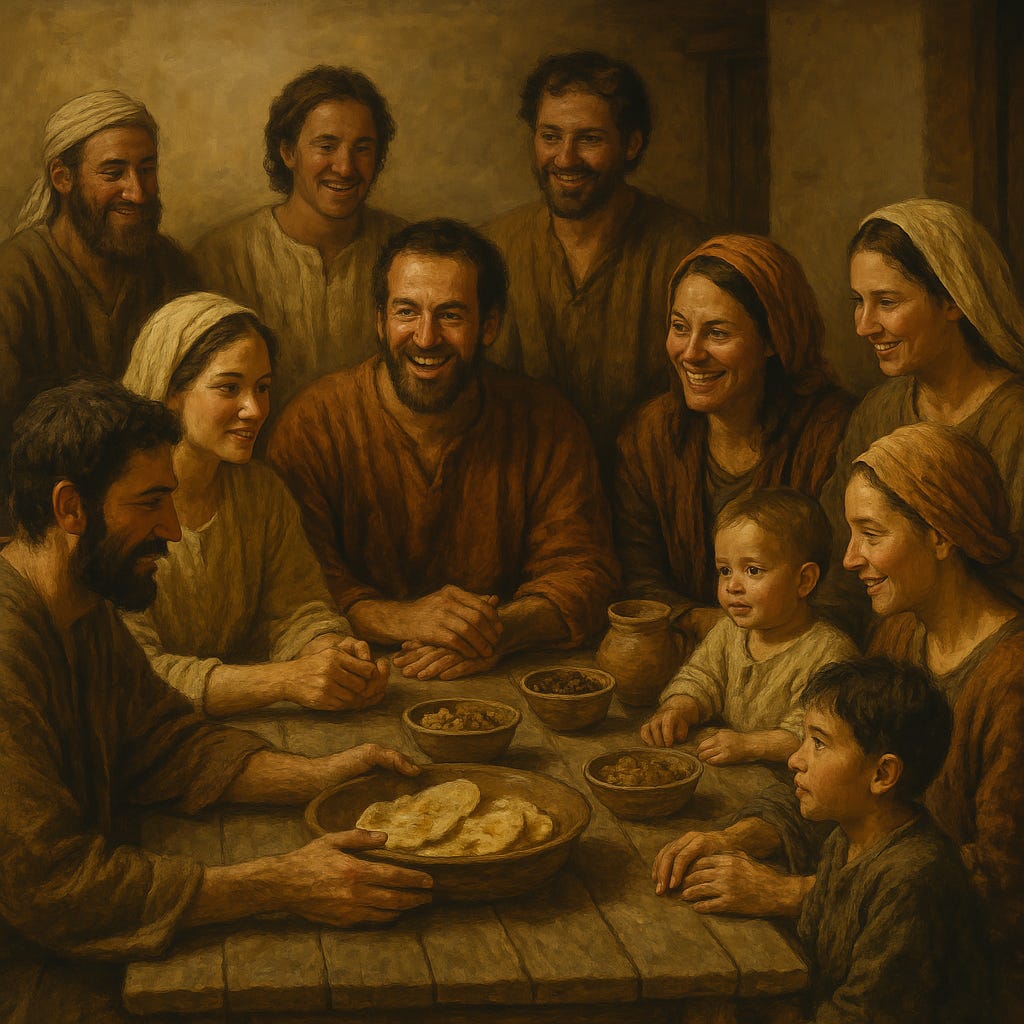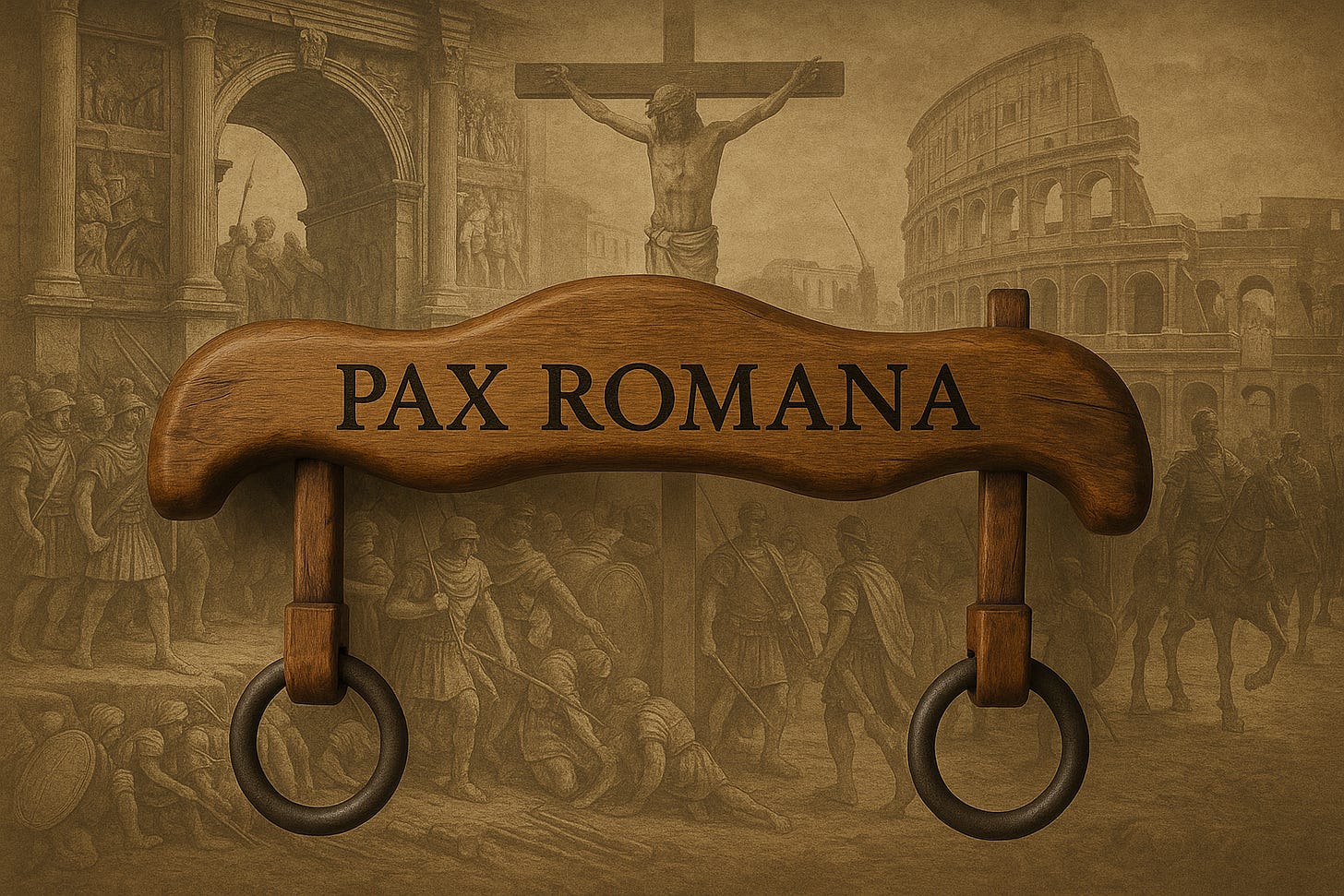Pax Romana or the Peace of Christ?
Empire Imposes. Christ Invites. The Church Forms a People for Communion. Lectionary 51 – Sixth Sunday of Easter (May 25, 2025) Readings: Acts 15:1–2, 22–29; Psalm 67; Revelation 21:10–14, 22–23; John
In Acts 15, the apostles are faced with a defining question: what is essential for Gentiles to become part of the Body of Christ? Some believers insist on circumcision and adherence to the Mosaic law. Others, attentive to the Spirit, recognize that the foundation of belonging has shifted. Identity is now rooted in communion with Christ, not in external codes.
The apostles do not respond with compromise. They speak with clarity, offering a path of reverence and invitation. Their conclusion marks a transition: from boundary-maintained holiness to formation toward sacramental life
“It seemed good to the Holy Spirit and to us not to burden you with anything beyond the following requirements: You are to abstain from food sacrificed to idols, from blood, from the meat of strangled animals, and from sexual immorality.” Acts 15:28–29
These were not moral minimums. They were preparatory disciplines—thresholds leading into communion.
Food Sacrificed to Idols – Preparation for the Table
In the ancient world, shared meals at pagan temples were religious events, not merely social customs. To abstain from these was to turn away from false worship and prepare to receive the true Body of Christ.
“You cannot drink the cup of the Lord and the cup of demons too.” 1 Corinthians 10:21
Blood and Strangled Animals – Reverence for Life
From the cry of Abel’s blood in Genesis to the blood of Christ poured out for many, Scripture treats blood as sacred. These instructions taught new believers to handle life—and the chalice—with awe. The blood of Christ is not symbolic only—it acts, it speaks, it accomplishes what nothing else can:
Forgiveness
“This is my blood of the covenant, which is poured out for many for the forgiveness of sins.” Matthew 26:28Redemption
“In him we have redemption through his blood, the forgiveness of sins, in accordance with the riches of God’s grace.” Ephesians 1:7Purification
“The blood of Jesus, his Son, purifies us from all sin.” 1 John 1:7Access to God
“We have confidence to enter the Most Holy Place by the blood of Jesus.”Hebrews 10:19Freedom
“To him who loves us and has freed us from our sins by his blood… to him be glory and power forever and ever!” Revelation 1:5–6A Better Word than Vengeance
“You have come… to Jesus the mediator of a new covenant, and to the sprinkled blood that speaks a better word than the blood of Abel.”
Hebrews 12:24A Witness that Cries for Justice
“What have you done? Listen! Your brother’s blood cries out to me from the ground.”
Genesis 4:10
Sexual Immorality – Covenant as Witness
The apostles were not merely instructing Gentiles to avoid impurity—they were calling them into a new story. In the surrounding culture, sexuality was often commodified, ritualized, or detached from covenant altogether. But in the biblical vision, the body is not an instrument of appetite. It is a vessel of glory, and marriage is not a contract—it is a covenant.
“For this reason a man will leave his father and mother and be united to his wife, and the two will become one flesh.”
Ephesians 5:31
Paul intentionally echoes Genesis, then expands it:
“This is a profound mystery—but I am talking about Christ and the church.” Ephesians 5:32
“The body is not meant for sexual immorality but for the Lord, and the Lord for the body.” 1 Corinthians 6:13
“Do you not know that your bodies are temples of the Holy Spirit…? You are not your own; you were bought at a price. Therefore honor God with your bodies.” 1 Corinthians 6:19–20
This was not about moral restraint for its own sake. It was about holiness lived in the body. Covenant fidelity in marriage mirrored the fidelity of Christ to His Bride. The Church was being taught to live not just in restraint, but in reverence. Not just to avoid harm, but to embody holiness.
Formation, Not Just Regulation
These practices weren’t hoops to jump through—they were habits of reverence. The Church was being formed not by compliance, but by preparation to dwell in God’s presence.
What Peace Cost: The Brutal Foundations of Pax Romana
Rome delivered infrastructure and stability, but its peace was secured through domination:
Mass Crucifixions: Spartacus’s revolt ended with 6,000 crucified on the Appian Way. (Appian, Civil Wars 1.120)
Scorched Cities: Carthage was burned and cursed. Jerusalem was besieged, and over 1 million perished. (Polybius, Josephus)
Public Humiliation: Vercingetorix, the Gallic leader, was paraded, then executed. (Plutarch)
Religious Coercion: Christians like Polycarp and Perpetua were executed for refusing emperor worship. (Eusebius)
Torture as Entertainment: Executions were staged in amphitheaters. (Seneca, Tacitus)
This was not peace. It was fear cloaked in order
Rome’s Yoke vs. Christ’s Invitation
Rome’s yoke was placed on the neck of the defeated. Its submission was public and humiliating. Cities that resisted were broken as a warning to others.
Jesus offers something entirely different:
“Take my yoke upon you and learn from me… for I am gentle and humble in heart, and you will find rest for your souls.” Matthew 11:29
Christ’s yoke is offered to the weary. It strengthens rather than crushes. It does not humiliate—it heals.
Psalm 67: The Peace that Shines
“May God be gracious to us and bless us and make his face shine on us… so that your ways may be known on earth.” Psalm 67:1–2
This peace is not secured through spectacle, but through blessing. It radiates from the face of God and draws the nations—not through conquest, but joy.
Revelation 21: A City With No Temple
“I did not see a temple in the city, because the Lord God Almighty and the Lamb are its temple.” Revelation 21:22
When Jesus spoke again to the people, he said, “I am the light of the world. Whoever follows me will never walk in darkness, but will have the light of life.” John 8:12
There is no need for a sun, because the Lamb is its light. There is no gate to shut, because holiness no longer needs protection—it has become the shape of the people who dwell there.
The Peace of Christ: Not as the World Gives
Rome’s peace subdued cities but did not make them whole. It preserved order at the expense of mercy. Jesus offers something no empire can fabricate:
“Peace I leave with you; my peace I give you. I do not give to you as the world gives.” John 14:27
The Church That Was Being Formed
The apostles were not lowering a standard. They were naming a threshold. What they gave the Gentiles was not a reduced law, but a sacramental beginning—a call to reverence, shaped for communion.
“We will come to them and make our home with them.” John 14:23
The Brilliant Light of The Loving Community
The city of God does not need a temple, because the Lamb is present at its center. There is no need for sun or moon, because His light fills every street and every face. And the gates are never shut, not because holiness is forgotten, but because love has completed its work.
We are being made into a people who shine. A people who live not in fear, but in fellowship. Not behind walls, but within the light.
“The Lord bless you and keep you; the Lord make his face shine on you and be gracious to you; the Lord turn his face toward you and give you peace.” Numbers 6:24–26


